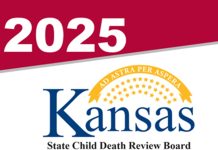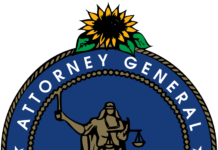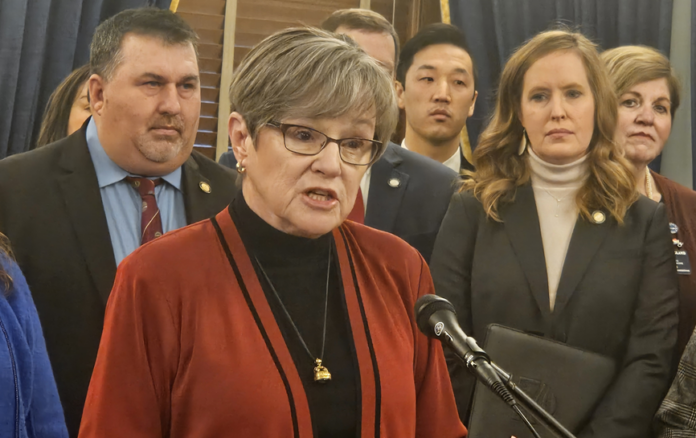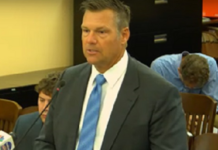Before the lawmakers even gaveled in for the 2024 legislative session on Monday, Democratic Gov. Laura Kelly pitched a new tax plan as an alternative to a flat tax proposal pushed by Republican leaders.
With support from a Republican senator and a conservative independent senator who helped kill the proposed single tax rate last year, Kelly unveiled a new tax plan that could cost about $1 billion over three years.
The new proposal calls for eliminating income taxes on Social Security, increasing the exemption for the 20-mill statewide property tax for schools, raising the standard deduction for income taxes, doubling the child care tax credit and providing a sales tax holiday for school supplies.
A variation of plans she has proposed before, the governor’s proposal comes at a time when the state is expected to have a $2.8 billion surplus in the current fiscal year.
The tax bill she vetoed last year had similar elements to what was laid out on Monday, including cost-of-living adjustments in the standard deduction and increasing the property tax exemption for the 20-mill levy for public schools from $40,000 of valuation to $60,000.
Kelly renewed her opposition to a single tax rate, which has been adopted in variations by 13 states nationally. Kelly has stressed that the so-called flat tax will disproportionately benefit wealthy taxpayers without helping less affluent taxpayers.
“Let me be clear, the flat tax is a nonstarter,” Kelly said. “The people who would benefit most from the flat tax by far are those making $260,000 a year or more. Any Kansans making less than that would see minuscule relief.”
House Speaker Dan Hawkins was disappointed in the first chip that the governor played in what could be a session-long debate.
“A simpler, single rate tax is needed to keep Kansas’s economy competitive with surrounding states,” Hawkins said in a statement.
“It seems we’re going to pick up right where we left off last session; I’m disappointed but not surprised to see the governor playing politics with taxpayer’s money once again.”
Kelly said there is nothing to suggest from other states with a flat tax that it would generate economic prosperity or create jobs.
The governor pointed to Arizona as an example, which had a $1.8 billion budget surplus a year ago and is now facing a $400 million shortfall for the current fiscal year and another $450 million in the following year.
The state moved to a 2.5% flat tax in 2021, replacing the state’s graduated income tax. It was phased in and fully took full effect last year.
The state’s graduated rate started at 2.59% and had a maximum of 4.5% for income over $159,000 a year for a single person.
The Associated Press reported that from July through November, Arizona saw a decrease of more $830 million in revenues from income taxes.
The AP noted that some of Arizona’s fiscal problems were compounded by a school choice program that is now expected to cost more than $900 million, well above the original $64 million it was estimated to cost.
As she has done before, Kelly alluded to the tax cuts signed into law by former Gov. Sam Brownback and the fallout they had on the state budget.
Those tax cuts exempted an entire class of businesses from paying income taxes and ultimately led to deficits when the budget wasn’t cut by a corresponding amount.
The governor noted that the state has now recovered from the era of the Brownback tax cuts and is now on steady enough financial footing where it can fully fund schools and doesn’t have to transfer money from the transportation budget to run the government.
She noted that the state recently led the nation in economic growth during the third quarter of last year.
“Implementing a flat tax would put all of that progress in jeopardy,” she said. “Over time, it would drive us back into the ditch.”
The latest tax plan rolled out Monday would:
- Increase the standard deduction for single Kansans from $3,500 to $5,000; for those with head of household filing status from $6,000 to $7,500; and for those who are married filing jointly from $8,000 to $10,000. This component is expected to cost $200 million.
- Exempt the first $100,000 in property taxes from the 20-mill property tax homeowners pay for schools. Last year’s tax bill would have taken the exemption for the state’s 20-mill property tax to $60,000. This provision would cost an estimated $200 million. The governor would offset reductions in funding for education from the state general fund.
- Eliminate state income taxes on Social Security income entirely, which will cost more than $525 million in the first five years of the plan. Last year, the Republican led Senate passed a bill that would have eliminated the state income tax on Social Security benefits at a cost of about $385.5 million over three years.
- Exempt back-to-school purchases from state sales taxes for four days starting on the first Thursday in August and ending on the following Sunday. The exemption would apply to clothing or clothing accessories or equipment with a sales price of $300 or less. It also would cover school supplies, school instructional materials or school art supplies with a sales price of $100 or less. Also included would be computers or school computer supplies with a sales price of $2,000 or less. In 2021, a Senate committee approved a bill creating a sales tax holiday for back-to-school sales, but the legislation later died. There are 19 states that already have sales tax holidays in places for various items, and at least eight others have three-day sales tax holidays for school supplies. The Missouri sales tax holiday applies to clothing with a value of $100 or less, school supplies not to exceed $50 per purchase and personal computers not costing more than $1,500. The component costs about $15 million.
- Double the child and dependent care tax credit that parents can claim to help pay for child and dependent care while they work or attend school. These tax credits are estimated to save Kansas families $18 million over three years.
The Democratic governor brought Republican Sen. Rob Olson of Olathe and independent Sen. Dennis Pyle of Hiawatha to the table to support the plan.
Olson and Pyle were blamed for helping to kill Republican efforts to override the governor’s veto of the flat tax last year.
Olson changed his vote on the flat tax, which ultimately came up two votes short of the two-thirds majority needed in the Senate to override the governor’s veto.
Olson’s vote coupled with Pyle’s opposition helped kill the bill in the Senate.
The bill also was hurt by the fact that Republican Sen. Alicia Straub of Ellinwood passed voting on the bill after supporting it when the Senate came up short on a 25-14 vote.
Olson dismissed any idea that his support for the Democratic governor’s plan would lead to him to being seen as a GOP turncoat. Olson is not running for reelection.
“I don’t care,” Olson said. “This isn’t high school all over again. I get elected by the people of the 23rd District to come up here and do what I think is best.
“I didn’t get elected to come up here and elect a leader to make my decisions,” he said.
“We need to be debating issues on the floor. That Social Security bill, it should have been done years ago,” Olson said.
“The problem is the special interests have control over this building.”
Olson said this bill is fairer to taxpayers.
“This is what a Rob Olson tax cut looks like,” he said. “This is how I think. I think right now the people at the bottom are getting hit extra hard. Being fair is important to me.”
Senate President Ty Masterson said he wasn’t surprised that Olson and Pyle signed on with the governor’s tax plan, but added their constituents might be.
“Even with the recent proclaimed record investments in economic development, Kansas is still ranked 8th in people leaving the state,” Masterson said.
“Therefore, any serious plan must reform our tax structure so we can enjoy sustainable economic growth that benefits all Kansans,” he said in a statement.
“Now that the political games are over and we know which team everyone is on, it’s time to work towards a compromise that accomplishes that goal.”
Pyle, who became an independent candidate to run for governor in 2022, said the new tax plan reflects initiatives he’s worked on over the years such as eliminating taxes on Social Security income. “I definitely want to cut taxes.”
Pyle blamed the failure of last year’s tax bill on Republican leadership’s refusal to give up on the single tax rate.
Last summer, Americans for Prosperity targeted Olson, Pyle of Hiawatha and Straub for casting votes that undercut the Senate’s attempt to override Kelly’s veto of the tax bill last session.
The deep-pocketed group sent 10,000 mailers into each district calling out the lawmakers for their vote on the tax bill.
It is not clear whether Pyle plans to run for reelection, but two Republicans – state Rep. John Eplee of Atchison and former state Senate candidate Craig Bowser – have filed to run for Pyle’s Senate seat this year.
“While we are always glad to see a proposal for tax reductions, Gov. Kelly is ironically proposing things she has already vetoed multiple times,” said Elizabeth Patton, state director for Americans for Prosperity.
“It’s a shame that she and Senators Olson and Pyle would be willing to oppose smart, sustainable and simple tax reform that benefits all Kansans in favor of merely cherry-picking policies with less impact for Kansas families’ everyday budget.”
















